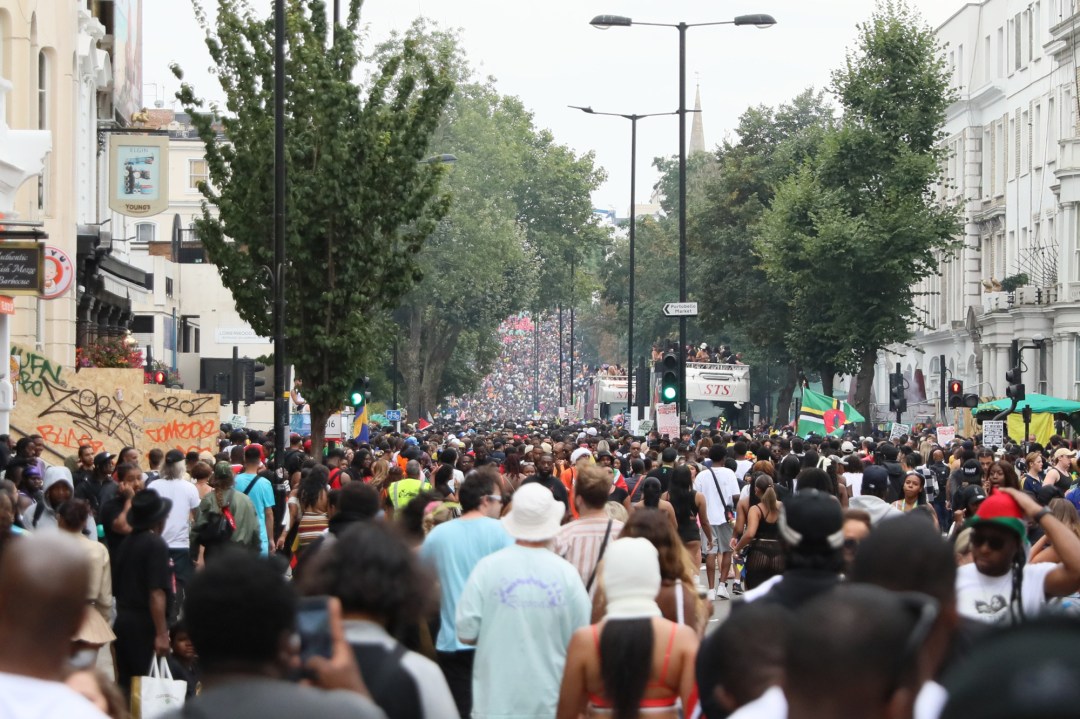Safety concerns around Notting Hill Carnival are nothing new. During last year’s event alone, 334 people were arrested and two people were killed, including 32 year-old Cher Maximen, who was stabbed to death in front of her young daughter during the festival’s ‘family day’. Forty-one year-old Mussie Imnetu was beaten to death during a separate altercation after the festival. Another eight non-fatal stabbings were also recorded.
But while so often the focus is on knife-crime, there is another, more fundamental, safety risk that has long been ignored: overcrowding. In a new report, the London Assembly’s police and crime committee has warned that Notting Hill Carnival is at risk of a Hillsborough-scale tragedy unless action is taken. It says the Metropolitan Police have consistently raised concerns about a ‘mass casualty event’ and calls on London Mayor Sadiq Khan to urgently review crowd safety measures – including pinch points and stewarding.
Yet these concerns are nothing new either. As far back as 2004, the Greater London Authority published ‘Notting Hill Carnival: A Strategic Review’, which highlighted the implicit danger of more than a million people converging on the streets of west London during one weekend.
In 2016, Met commander Dave Musker told the London Assembly that ‘each year… we come exceptionally close to a major catastrophic failure of public safety where members of the public will suffer serious injury.’ Then in January 2017, another GLA report raised similar concerns, warning of a ‘catastrophic public safety incident’ and recommending changes to the parade route and moving elements of Carnival. Even Sadiq Khan has acknowledged the risk of overcrowding, admitting during a Mayor’s Question Time session last year: ‘you’ve got a finite space and more and more people wanting to come. It is really important for the organisers to listen to the concerns.’
All of which raises several questions. Firstly, if the risks are so universally accepted, why has so little been done to mitigate them? It is a total and utter abdication of responsibility from both the organisers of Notting Hill Carnival and the city’s authorities. As Lee Jesper, a former policing director for the Greater London Authority, wrote in 2017, ‘either you ensure that public safety issues are addressed, or if you sanction a public event knowing the organisers cannot meet their licensing and public safety requirements, that responsibility by default falls to you. In effect, RBKC (Royal Borough of Kensington & Chelsea) are rolling the dice every year by sanctioning a public event that they know to be unsafe.’
More fundamentally: if neither the organisers, the local authority, or the Mayor’s office, are prepared to seriously address safety concerns dating back more than 20 years, why should taxpayers foot the bill of policing it? In 2023, the Met spent more £11 million policing the event, including more than £5 million on overtime and more than a million on infrastructure including barriers and hostile vehicle mitigation. Last year, around 7,000 officers were on duty during the event, drawn from both local policing teams and specialist units. Is it really justifiable to divert so many police resources for what amounts to a bank holiday bender?
Sadiq Khan claims the Notting Hill Carnival adds £93 million to London’s economy and creates the equivalent of 3,000 full-time jobs, but these figures, from 2002, seem nebulous at best. The truth is that for many on the progressive left, the very notion of Carnival has become so idealised that they refuse to fully acknowledge its flaws. Criticism of it is viewed as criticism of multi-racial Britain. The fact that similar celebrations of Afro-Caribbean culture, including Bristol’s St Pauls Carnival, pass far more smoothly each year, goes ignored.
Given all the incidents over recent years and the persistent safety warnings, it really is not unreasonable to ask some fundamental questions about Notting Hill Carnival’s long-term future. When tens of millions of pounds are spent policing it each year, when nine out of ten residents along the parade route leave their homes during it, and when warnings of a Hillsborough-style overcrowding incident have gone unheeded for more than two decades: is Notting Hill Carnival really worth the risk? And if it is, why should we foot the bill?








Comments